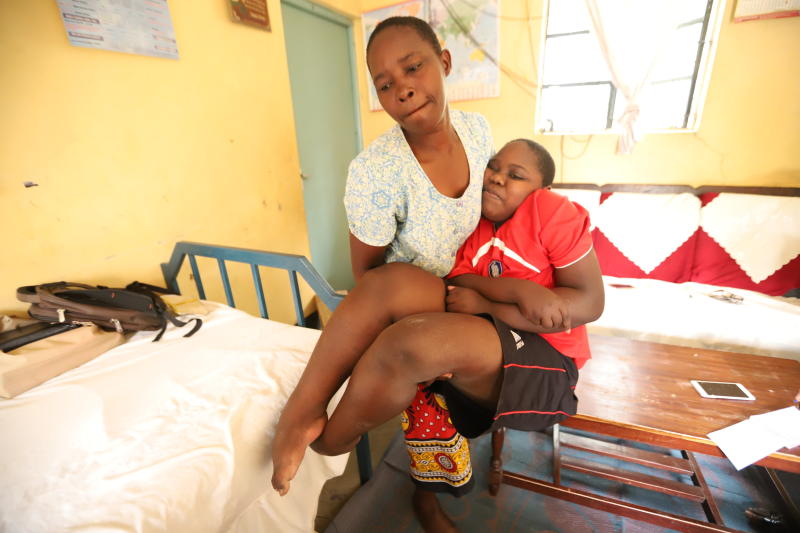
Nelly Achieng carries her fourteen year old son Philip Otieno who is suffering from Muscular dystrophy on October 10,2018 to his bed at their residence in Rabuor in Kisumu county. Nelly has lost three older children to the disease and the remaining two are also affected. (Denish Ochieng/ Standard)
Phillip Otieno, 14, stretches his hand out to wave, but it falls with a slow thud on his laps. When he tries to smile, his lips remain frozen in an uncomfortable frown.
He sighs and gazes into space as his mother Nelly Achieng, starts talking about the disease ravaging him and his little brother – one that already killed his three other siblings: Duchenne Muscular Dystrophy (DMD).
In between sobs, Ms Achieng explains the painful path she has walked as a mother taking care of children with a genetic disorder that doctors say is so rare in Kenya that they have not established sufficient health care systems to care for patients.
Dr Juliana Otieno, pediatrician and former CEO of Jaramogi Odinga Teaching and Referral Hospital explains that the condition is rare and never detected easily unless genetic screening is done among women.
“She says it manifests in boys at a young age. In many cases those infected die after three or four years due to respiratory failure; it is a rare condition in Kenya,” says Dr Otieno.
Achieng was waiting to join high school when she had her first born son, 30 years ago. Despite the challenges of being a young mother, she was glad that her son was healthy and seemed to grasp things faster than his agemates.
Then misfortune struck when he was only six years old. He developed severe muscle pulls and started walking on toes, avoiding stepping on the ground with his feet.
Muscle wasting disorder
At the referral hospital, he was diagnosed with DMD. It is a muscle wasting disorder caused by defective genes. Sons have a 50-50 chance of inheriting the disorder from their mother, if she carries the gene on one of her X chromosomes. “The pediatrician told me that the condition has no cure and eventually my son would die,” she says.
Numerous trips to hospitals and several therapies extended his lifetime, but he eventually passed on in 2009.
Achieng gave birth to a second son when the first born was eight years old. He also developed the same symptoms at age five, but his manifested as painful joints that would make him wail when touched. “On seeking medication medics diagnosed the same condition. He could not go to school because I could not afford fees for a special school,” says Achieng. He died in 2012.
Her third son was also born with the same condition that doctors diagnosed when he was three. Achieng says she got into depression, knowing the fate that would befall him. He died last year.
She has two living sons who are showing signs of DMD.
“I pray and even look for intercessors who can pray and have God change things, but all has been in vain,” she says. “People say it is witchcraft and that my family is cursed. My husband left when my last born was diagnosed and he has never been back,” she says.
The boys get weekly therapy that costs Sh1000 per session, money she says she can barely raise.
“I cannot afford the fee. They have also been put on a special diet that is costly,” she says. She adds that Phillip needs a special wheelchair that costs Sh28,000, but since she cannot afford it, she carries him everywhere he goes. “He is heavy, but I have no option,” she says.
She explains that what makes it even more painful is when the children ask about the reality of their condition that has no cure. “They keep asking if there is life after death. They know they will die soon, just like their siblings. It is very painful,” says Achieng.
Dr Osborne Mabalu, physiotherapist and lecturer at Maseno University says the condition is rare and affects one in 3,500 newborn males. Diagnosis is often delayed, especially in Kenya.
“The condition cannot be detected in mothers but it prevails in their sons whose health start deteriorating at a young age,” says Mabalu.
He explains that the condition, which has no cure can only be managed through counseling of male children and muscle exercising.
“Once in manifests it progresses until death; it varies from one patient to another depending on one’s immunity among other environmental factors,” adds Mabalu.
He clarifies that the condition does not affect a child’s intellectual ability, though they will generally be slow and get tired easily. “The diseased children require a wheelchair in order to move around, otherwise they become bed ridden,” says Mabalu. For Achieng, life has taught her to take one day at a time, and pray that she does not lose her two remaining children.
 The Standard Group Plc is a multi-media organization with investments in media
platforms spanning newspaper print
operations, television, radio broadcasting, digital and online services. The
Standard Group is recognized as a
leading multi-media house in Kenya with a key influence in matters of national
and international interest.
The Standard Group Plc is a multi-media organization with investments in media
platforms spanning newspaper print
operations, television, radio broadcasting, digital and online services. The
Standard Group is recognized as a
leading multi-media house in Kenya with a key influence in matters of national
and international interest.











